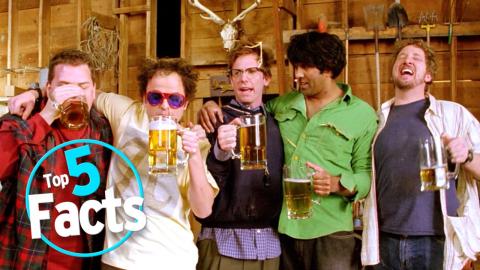Top 5 Facts about Getting Drunk

Woo, getting drunk! Everybody wants, no, does it, once in a while, you know? So, let's just...let's just count it down. Welcome to Watchmojo's Top 5 Facts. For today's installment, we're looking at the most interesting facts about how alcohol interacts with the human body.
Special thanks to our user IrisFan FanIris for submitting the idea on our Suggestion Tool at http://www.WatchMojo.comsuggest
#5: Why Exactly Do We Get More Confident When We're Drunk?
Do you ever wonder why you turn into your smoother, more confident alter ego when you're drunk? A study from the Society of Neuroscience has your answer, and it has to do with the part of your brain responsible for detecting threats. In their study, they performed brain scans on a group twice, once sober and once drunk, while they were shown scary images. When sober, there was activity in the amygdala, insula, and parahippocampal gyrus, regions associated with fear response. When drunk, there was significantly less activity, indicating when drunk that your brain circuits can't tell the difference between threatening and non-threatening stimulus. With no threats, confidence abounds! Not to mention charm and tact.
#4: Vodka + Red Bull = Bad Idea
Yeah! College! Freedom and parties and all that fun stuff! But, the bro who whips out the Red Bull, give him a little punch in the neck. Researchers have found that students who mix using energy drinks are twice as likely to drive with an intoxicated person, to become injured, and to receive medical attention than those drinking just liquor. This is likely because the symptoms of drunkenness are seemingly reduced due to the stimulating effects of the caffeine, but the actual drunkenness is not. So you’re drunk, but don’t know it, and since you’re wired, you can drink more without passing out. Many states and countries have banned or restricted the sale of caffeinated alcoholic beverages, including the infamous Four Loko.
#3: You're More Likely to Survive a Accident Drunk Than Sober
Some good news, and some bad news if you’re an alcoholic. A study conducted by Harvard-UCLA Medical Center found that in the nearly 8,000 traumatic accidents they studied, 7% of sober patients died compared to only 1% of drunk patients. More study is needed to figure out exactly how this works, but basically alcohol alters the body's response to injury in a way that seems to help both survival and recovery. The bad news: many people think that alcohol relaxes your limbs and muscles, allowing you to better take an impact than if your body tensed in anticipation, but researchers from the University of Illinois at Chicago say that this effect is either overestimated or completely false. More bad news: drunks are still much more likely to wind up in an accident than sober people.
#2: Only 8% of Sports Fans Get Drunk at Games
This is according to an American study published in 2011, which confirmed the findings of a Canadian study in the 90s. The researchers gave a breathalyzer test to a small sample of attendees leaving baseball and football games. 8% of them were over the legal blood alcohol content limit for driving. I kinda expected it to be more than that. But consider this: the average NFL stadium holds somewhere around 70,000 people. That translates to well over 5,000 legally drunk people flooding onto the streets and highways at once, making me not want to be part of the other 92%.
#1: It's Possible to Achieve a Reverse Tolerance
...but that doesn’t mean you should be proud of it. It's a well-known fact that greater alcohol consumption leads to a higher tolerance. This is because steady changes occur in the brain and liver to adapt to the large amounts of alcohol. However, a heavy drinker wreaks havoc on their liver, often resulting in liver damage. When the liver is damaged, it no longer produces enough enzymes to break down alcohol and can't metabolize it, leading to a much lower tolerance than before. With a filtration system that doesn't work, alcohol gets into the blood much faster and easier, allowing these individuals to essentially become drunk off very few drinks.
So, what do you think? Should caffeinated booze be more widely available? For more social lubricant top tens and fall on your face top fives, be sure to subscribe to Watchmojo.com.
